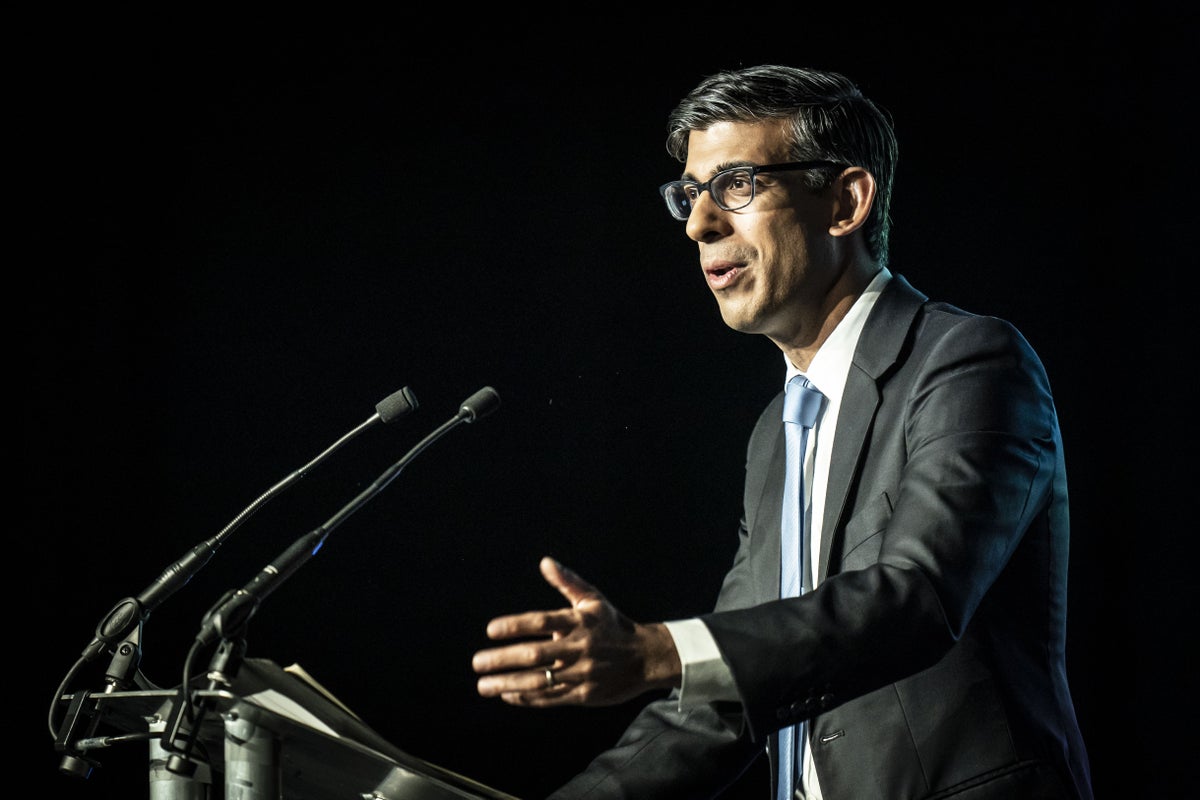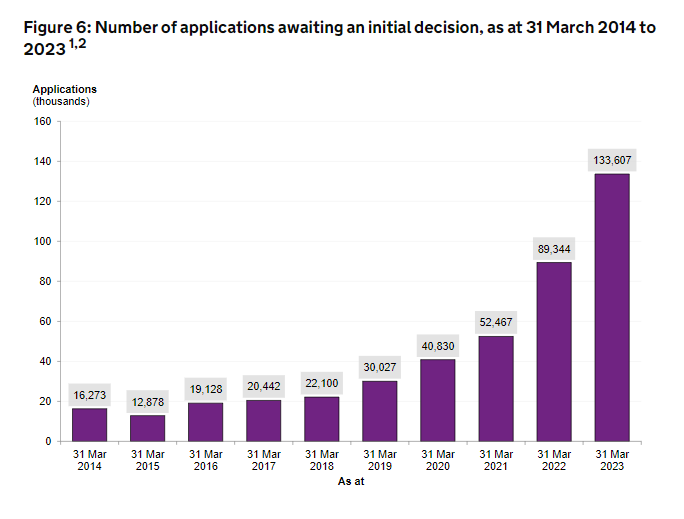
Rishi Sunak’s pledge to clear a backlog of asylum decisions by the end of this year is on course to fail after the annual cost of Britain’s asylum system hit £3.6bn, a watchdog has revealed.
The National Audit Office (NAO) said Home Office officials had internally warned that the pledge is “in doubt, with urgent action required” as costs soared amid an accommodation crisis, “unrealistic” targets, staffing issues and “highly uncertain assumptions” made by the government.
In a flagship speech on migration in December, the prime minister vowed “to abolish the backlog of initial asylum decisions by the end of next year”, but Downing Street swiftly clarified that he was only referring to “legacy” applications lodged before last June.
NAO’s report said even that target is at risk, finding: “While decisions are increasing, the Home Office is not yet making enough decisions on legacy claims to clear the backlog by December 2023.”
The UK’s independent public spending watchdog warned that the cost of Britain’s asylum system hit £3.6bn in 2022-23 and could rise further, despite the introduction of new laws the government “believes will improve the cost and fairness of the asylum system”.
Stephen Kinnock, Labour’s shadow immigration minister, said the Conservatives had “lost control at an astronomical cost to the taxpayer”.
“The prime minister’s focus on the ‘legacy claims’ is in essence a red herring, and the actual backlog is likely to see an influx of another 23,000 claims by December,” he added.
NAO calculated that 2,200 decisions would have to be made every week for the prime minister’s target to be met – but the current figure is only 1,300.
Most of those are not full grants or refusals of asylum but “administrative decisions”, where applications are “withdrawn” from the system.
“The Home Office may consider a claim implicitly withdrawn if, for example, a person seeking asylum leaves the UK before an asylum decision is made, fails to attend an asylum interview, or fails to complete an asylum questionnaire when asked to do so,” NAO report said.
An asylum decision-maker told The Independent the Home Office had been setting “impossible” targets and unfairly attacking workers’ productivity, when they are hampered by the department’s own policies and technology.
“They are not trying to solve the backlog,” he added. “They’re trying to refuse as many people as possible.”
NAO warned that the prime minister’s backlog pledge last December had forced the Home Office to “reprioritise its activities to achieve these shorter-term targets”, letting the backlog of post-June 2022 claims build.

By the end of April, there were almost 138,000 claims awaiting an initial decision, including over 60,000 newer applications deprioritised as a result of the prime minister’s target.
The delays are driving up the costs because of a legal duty on the government to house and support any destitute asylum seekers while their claims are being considered.
In February, the government announced a new system of fast-track asylum questionnaires for countries with high grant rates, including Afghanistan and Syria.
The scheme was expanded further last week, as the government scrapped measures introduced by Priti Patel that slowed down decisions, but NAO revealed that “Home Office staff have raised concerns that the rate and quality of questionnaire returns were lower than their assumptions”.
They warned that decisions based on the forms, which must be filled out in English regardless of the asylum seeker’s first language, could result in wrongful decisions and an increase in court appeals.
The questionnaires are part of a wider asylum transformation programme, which started in 2021 and aims to speed up decisions and reduce costs.
“The business case for the programme is based on a range of highly uncertain assumptions,” NAO warned, saying the Home Office had made unevidenced predictions about the number of people claiming asylum, the number of caseworkers it could employ, their productivity and costs.
The report said that the Home Office based its policy partly on an “expectation” that by April this year, it would be deporting 250 people each month to Rwanda or other countries where their asylum claims could be processed. The number is currently zero.

The Home Office has given the whole asylum transformation programme an amber/red rating, meaning it was “in doubt, with urgent action required and possible delays to delivery”, the report said.
An official review found there were “unrealistic ambitions around accommodation and the productivity of caseworkers” and issues with “staffing capacity in parts of the Home Office”.
Other issues include the absence of an operational asylum agreement with Rwanda or any other country, and the struggle to procure sufficient accommodation or advance controversial plans to use military bases and barges.
Alex Fraser, the British Red Cross’s director for refugee support, said people “cannot get on with their lives until the government processes their asylum claims”.
“We see every day the toll this takes on their physical and mental health,” he added: “More than 172,000 men, women and children living in limbo.”
The Refugee Council spokesperson called for the government to set out a “more ambitious, fair, and workable approach to tackling the backlog” instead of pushing through “unworkable and expensive legislation”.
A Home Office spokesperson said: “The government is working non-stop to reduce the asylum backlog and deliver cheaper, more orderly alternatives to hotel accommodation.
“As NAO acknowledges, we have already doubled the number of caseworkers and cut the legacy backlog by 20 per cent, but we know more must be done to bring the asylum system back into balance.
“The Illegal Migration Bill will stop the boats by detaining those who come to the UK illegally, and swiftly returning them to their home country or a safe third country.”







